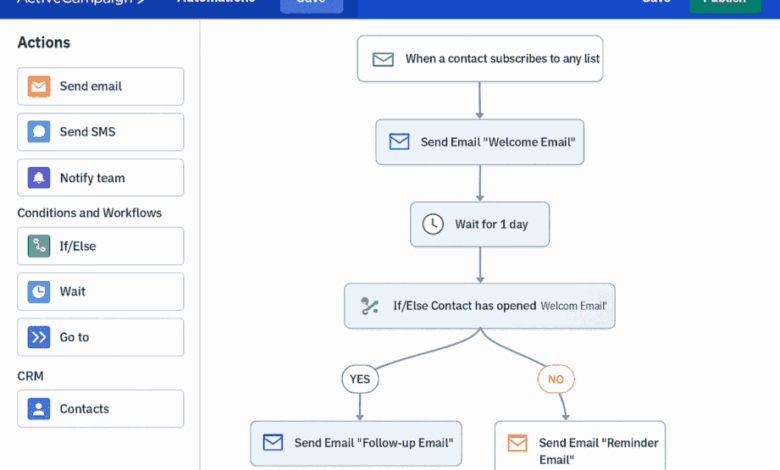ActiveCampaign Review: CRM With Email Marketing (2025)

If you’re evaluating multiple platforms for your business needs, our comprehensive roundup of CRM + email tools puts ActiveCampaign in context alongside 14 other solutions.
🎯 Ready to Try Advanced Automation?
Join 180,000+ businesses using ActiveCampaign’s behavior-driven workflows
✅ 14-day free trial – No credit card required
ActiveCampaign earned its reputation as the “automation powerhouse” for good reason. The platform genuinely excels at creating sophisticated, behavior-driven email sequences that feel almost magical when they work properly. But honestly, that power comes with some trade-offs that might surprise you—particularly around pricing and the learning curve.
The short version? ActiveCampaign is brilliant for marketing-heavy teams that need advanced automation and can invest time learning the platform. However, if you’re looking for simple email marketing or comprehensive CRM functionality, other options might serve you better. The automation builder is legitimately impressive, but the CRM feels more like an add-on than a core strength.
Snapshot and verdict
Who it’s for: Marketing-focused small to medium businesses that need sophisticated automation workflows, particularly B2B companies with complex nurture sequences and teams comfortable with moderate technical complexity.
Pros:
- Industry-leading automation builder with visual workflows and conditional logic [4]
- Excellent email deliverability (93.4% according to independent testing) [5][6]
- 900+ integrations including deep ecommerce connections [4]
- AI-powered campaign builder and content generation [7][8]
- Behavioral triggers and advanced segmentation capabilities [1]
- Competitive pricing for automation features compared to enterprise alternatives [2]
Cons:
- CRM features require expensive add-ons ($68-$179/month per user) [1]
- Pricing scales aggressively with contact growth—from $49 to $489/month for 25K contacts [2][1]
- Email editor can be buggy with formatting issues [2]
- Learning curve is steeper than alternatives for simple use cases [2]
- No native SMS or WhatsApp without third-party integrations [9]
Quick pricing context: Starter at $15/month covers basics; Plus at $49/month unlocks real automation; Professional at $79/month adds advanced features; Enterprise at $145/month includes custom objects.
Key features and CRM-email fit
Email automation capabilities
ActiveCampaign’s visual automation builder is genuinely sophisticated. You can create multi-branch workflows triggered by email opens, link clicks, website visits, purchase behavior, or custom events. The conditional logic handles complex scenarios—send different emails based on previous engagement, wait for specific actions, or branch flows based on contact properties.
ActiveCampaign’s visual automation builder interface
The AI automation builder, introduced in 2024, lets you describe your goals in plain language and generates workflows automatically. Just type “Send 3 emails with a 2-day wait in between” and the system builds exactly that. It’s surprisingly effective for common scenarios like welcome series, abandoned cart recovery, or lead nurturing sequences.
What sets ActiveCampaign apart is the depth of behavioral triggers. You can segment based on email engagement patterns, website activity, purchase history, or custom events tracked via API. The platform offers 900+ automation templates designed for specific outcomes, making it easier to get started with proven workflows.
AI-powered campaign creation
The AI Campaign Builder, launched in late 2024, transforms how marketers create campaigns. This feature generates fully personalized email campaigns from a single prompt, including subject lines, preheader text, layout, images, content, and calls to action.
The system integrates with your brand kit to maintain consistency across campaigns while offering template customization options. You can make quick edits to content, swap images, and update links without starting from scratch. This dramatically reduces campaign creation time while scaling personalization across multiple audience segments.
Email design and templates
The drag-and-drop editor covers essentials but feels less polished than dedicated email platforms. ActiveCampaign offers 125+ templates based on business goals, layouts, and pre-designed options, though customization options aren’t as extensive as some alternatives.
Dynamic content personalization pulls CRM data into emails automatically—names, company details, purchase history, or custom fields. The conditional content feature shows different blocks based on contact segments, though this requires the Plus plan or higher.
CRM integration reality
Here’s where expectations might not match reality. ActiveCampaign includes basic contact management and deal tracking, but full CRM functionality requires paid add-ons that significantly increase costs.
The base CRM handles contact records, basic pipeline views, and simple deal tracking. However, advanced features like lead scoring, sales automation, and detailed reporting require expensive add-ons:
- Pipelines enhanced CRM: $68/month per user
- Sales Engagement enhanced CRM: $111/month per user
For teams primarily focused on email marketing with light CRM needs, the basic functionality suffices. For sales-heavy organizations, the add-on costs make ActiveCampaign expensive compared to dedicated CRM platforms.
💡 See ActiveCampaign’s Automation in Action
Test behavior-driven workflows with real data in your 14-day trial
⚡ Setup takes under 5 minutes
Segmentation and personalization
Advanced segmentation is a genuine strength. You can create dynamic segments based on email behavior, website activity, purchase patterns, custom field values, or engagement scores. Tags provide additional organization for complex contact management.
Predictive sending optimizes email delivery times based on individual contact behavior patterns. Lead scoring automatically rates contacts based on engagement, demographics, and custom criteria—though this requires Plus plan or higher. The AI can also predict win probability for deals and suggest optimal content based on engagement history.
Reporting and analytics
Campaign reporting covers standard metrics plus some useful additions. Attribution tracking connects email engagement to revenue when integrated with ecommerce platforms. The visual automation reports show how contacts flow through sequences, highlighting bottlenecks or optimization opportunities.
Advanced reporting on Professional and Enterprise plans includes revenue attribution, ROI calculations, and predictive analytics. The reporting interface can feel overwhelming for simple needs but provides depth for data-driven teams. Custom reporting is available as an add-on for $159/month on Plus and Pro plans.
Pricing and how it scales
Starter plan ($15/month)
Includes basic email marketing, simple automation (5-step sequences), and contact management for 1,000 contacts. Email sends limited to 10x contact count monthly. The automation features are restricted enough that most businesses outgrow this quickly.
Plus plan ($49/month)
This is where ActiveCampaign becomes genuinely useful. Unlimited automation steps, conditional content, A/B testing, basic CRM, and landing pages unlock for 1,000 contacts. Email sends increase to 10-12x contact limit.
The Plus plan pricing scales aggressively:
- 2,500 contacts: $99/month
- 5,000 contacts: $149/month
- 10,000 contacts: $229/month
- 25,000 contacts: $379/month
Professional plan ($79/month)
Advanced segmentation, attribution tracking, predictive content, and priority support for 1,000 contacts. This tier includes most features teams need for sophisticated marketing automation.
Pricing continues scaling steeply:
- 5,000 contacts: $209/month
- 10,000 contacts: $339/month
- 25,000 contacts: $549/month
Enterprise plan ($145/month)
Custom objects, advanced reporting, single sign-on, HIPAA compliance, and premium support. Email sends increase to 15x contact limit. Designed for larger organizations with complex automation needs.
CRM add-on reality check
The pricing becomes complicated when you need real CRM functionality:
- Pipelines enhanced CRM: $68/month per user
- Sales Engagement enhanced CRM: $111/month per user
- Custom reporting: $159/month for 50 reports and 25 dashboards
Multiple users multiply these costs quickly. For a team of 3 users on Professional plan with Pipelines add-on, monthly costs exceed $500 before considering contact-tier pricing.
Integrations
Native integration strength
ActiveCampaign offers 900+ native integrations, including deep connections with Shopify, WooCommerce, Salesforce, HubSpot, Zapier, and major advertising platforms. Ecommerce integrations are particularly robust, enabling abandoned cart recovery, purchase-based segmentation, and revenue tracking.
Zapier integration provides access to thousands of additional apps, though complex workflows may require paid Zapier plans. The open API and webhook support enable custom integrations for technical teams.
Data sync quality
Most native integrations sync data bidirectionally and update in real-time. Contact properties, purchase history, and behavioral data flow between platforms reliably. The deep ecommerce connections enable sophisticated abandoned cart sequences and post-purchase automation.
Use cases and alternatives
Ideal scenarios for ActiveCampaign
B2B lead nurturing benefits from the sophisticated automation capabilities. Multi-touch campaigns based on content downloads, webinar attendance, and engagement scoring work elegantly when properly configured. The behavioral tracking enables precise targeting based on website activity and content engagement.
Ecommerce businesses can leverage deep Shopify/WooCommerce integrations for abandoned cart recovery, post-purchase sequences, and customer lifecycle automation. The behavioral tracking enables personalized product recommendations based on browsing and purchase history.
Content marketing teams appreciate the ability to trigger email sequences based on blog visits, content downloads, or engagement patterns. The automation builder handles complex nurture campaigns effectively, with the ability to segment based on content consumption patterns.
When to consider alternatives
- Simple email marketing needs might be better served by Brevo for budget-friendly sending or GetResponse for easier automation setup.
- CRM-heavy teams should consider HubSpot for integrated CRM+email or Pipedrive + Campaigns for sales-focused workflows without expensive CRM add-ons.
- Budget-conscious businesses might prefer EngageBay for similar automation at lower cost or Zoho CRM for integrated suite pricing.
ActiveCampaign vs HubSpot comparison
ActiveCampaign excels at email automation complexity and offers better value for automation-focused teams. HubSpot provides more comprehensive CRM functionality and better scalability for growing businesses, though at higher cost.
ActiveCampaign’s deliverability (93.4%) significantly outperforms HubSpot (79.8%) in independent testing, which matters for campaign effectiveness.
Email deliverability
ActiveCampaign maintains excellent deliverability with a 93.4% inbox placement rate according to 2025 independent testing by EmailToolTester—ranking first among major email platforms. This represents over 8 percentage points higher than the industry average.
The platform scored well across different email categories, with clothing, food & drink, and home & garden emails achieving 84%+ inbox rates. Even challenging categories like finance and health maintained 78-79% inbox placement.
Built-in list hygiene tools automatically suppress bounces, unsubscribes, and spam complaints. The automation builder enables sophisticated re-engagement campaigns to maintain list health. Dedicated IP options are available for high-volume senders with automated warming processes.
The platform handles SPF, DKIM, and DMARC authentication automatically and provides guidance for custom domain setup. Deliverability monitoring includes reputation tracking and seed testing tools to reveal where emails land.
FAQs
- Is ActiveCampaign suitable for beginners?
- The basic features are approachable, but the platform’s strength lies in advanced automation that requires moderate technical comfort. Teams new to marketing automation might prefer simpler alternatives initially, though the extensive template library and AI features help reduce the learning curve.
- How does ActiveCampaign’s CRM compare to dedicated platforms?
- The basic CRM handles contact management and simple pipelines adequately, but full functionality requires expensive add-ons ($68-$111/month per user). Dedicated CRM platforms typically offer better value for sales-focused teams.
- What happens when you exceed contact limits?
- ActiveCampaign automatically moves you to the next tier when contact limits are exceeded. Since pricing scales aggressively, this can create surprise billing increases—from $49 to $99/month when moving from 1,000 to 2,500 contacts.
- Are there email sending limits?
- Yes, plans include send limits based on multiples of your contact tier (10x for Starter/Plus, 12x for Pro, 15x for Enterprise). Overage fees apply for excessive sending.
- Does ActiveCampaign integrate with other CRM systems?
- Yes, native integrations exist for Salesforce, HubSpot, and other major CRMs, though using external CRMs reduces the platform’s integrated value proposition.
- What AI features are included?
- ActiveCampaign offers AI-powered automation building, campaign creation, content generation, predictive sending, and win probability scoring. Most AI features require Plus plan or higher.
Looking for detailed automation comparisons and alternative recommendations? Our complete guide to CRM with email marketing software evaluates ActiveCampaign alongside 16 other platforms to help you find the right fit for your automation needs and budget.
This article contains affiliate links. If you purchase through them, we may earn a commission at no extra cost to you.
🚀 Ready to Transform Your Email Marketing?
ActiveCampaign’s automation builder is waiting for you to explore
🎯 Join 180,000+ businesses – No setup fees
ActiveCampaign delivers exceptional value for teams that need sophisticated email automation and can invest in learning the platform’s capabilities, though the CRM add-on costs and aggressive pricing scale may surprise budget-conscious businesses.




